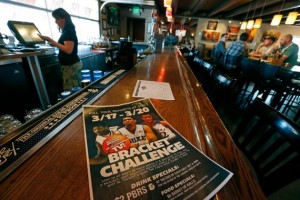In Robert Altman’s 1970 film M*A*S*H* there’s a moment in which George Wood’s General Hammond approaches Roger Bowen’s Colonel Blake with a scheme to make some easy money: a football game between the motor pool and the medical unit. He explains, “We put on a football game, we put up a few bets, five thousand maybe, and have a little fun. Special Services in Tokyo says it’s one the best gimmick we’ve got to keep the American way of life going here in Asia.”
“Betting?” asks the Colonel.
“No, football,” the General responds.
But perhaps it’s the Colonel who had it right. The American way of life—or, more accurately, the American way of fandom—is at least as much about gambling as it is about sports. Especially around this time of year. Consider the following:
- Estimates of how much is legally wagered on the tournament—that is, through state-licensed sports books in Delaware, Montana, Oregon and mostly Nevada—range from $90 million to $100 million. According to a recent story in the Dallas Morning News, the tab could be as high as $227 million.
- Two years ago, the LA Times cited an FBI source that more than $2.5 billion was illegally wagered on the NCAA Men’s Basketball Tournament.(Does that illegal gambling include your office brackets? Technically, it could, if you’re not in one of the four states mentioned above. No one, however, has ever been prosecuted for friendly office pools—more on that later.)
- R.J. Bell, owner of Pregame.com—not a gambling site but one that analyzes betting news and point spreads—estimated that last year $12 billion was bet, worldwide, on March Madness. That’s about $2 billion more than was bet on February’s Super Bowl game between the Seattle Seahawks and the Denver Broncos.
Allen Barra | TheAtlantic.com





